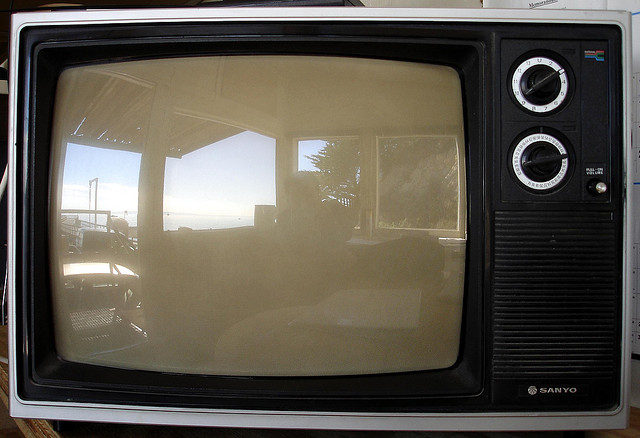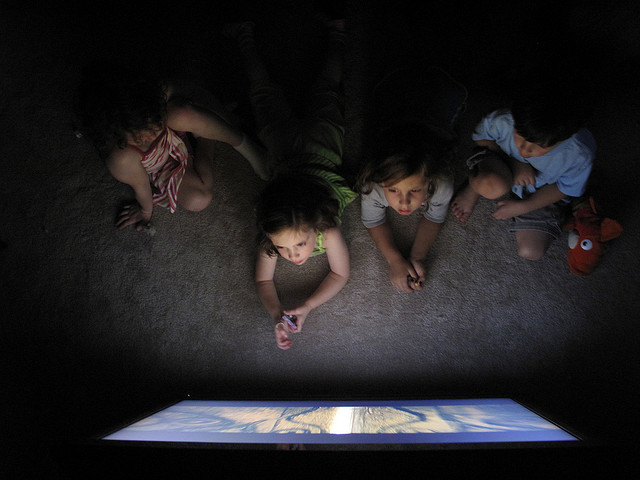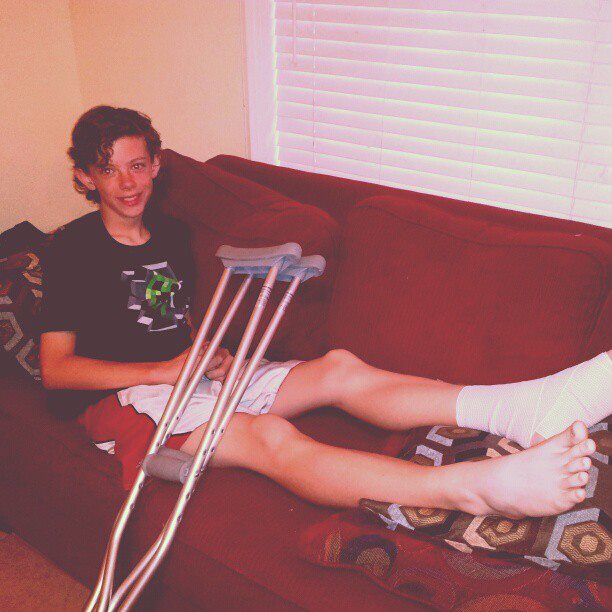
Thanks to Alice for another spot-on guest post!
I was raised without cable TV. Actually, there were long stretches of my upbringing where we didn’t even own a TV, until my aunt and uncle would come to visit and bring one of their (many) old black and white TVs that wasn’t being used in their house. Then we would be able to tune in the local channels, wiggling the rabbit ear antennas around until the fuzzy lines actually resembled peoples’ faces. Sort of. To give you a little perspective, I’m 36 years old at the time of this writing. My peers grew up watching Fame, The Cosby Show, Family Ties, The Wonder Years, and Beverly Hills 90210. And probably a lot more stuff I can’t think of because, you know, we didn’t have a TV.
Our TV situation was complicated even more by my parents’ prejudice against it; we could have afforded a TV, but it was beneath them. TV? No no, we’re readers. Even when we owned those secondhand black and white sets, we weren’t actually allowed to watch anything. The standing rule in the house was No TV On School Nights. If it wasn’t a school night, I could maybe watch something but there was a whole lot I wasn’t allowed to watch. On that list were innocuous things like Golden Girls (because Blanche Devereaux had indiscriminate sex). Over and over again, I heard how TV was going to turn my brain to mush, or rot my brain, or was a waste of time, or was junk. Why didn’t I read a book or go outside? As a matter of fact, turn off that TV and do something else. Sometimes I was allowed to finish whatever I was watching, and sometimes I wasn’t. (And just for the record, my parents were and are excellent parents. This post is not meant to malign or judge them.) Their rationale – that TV was junk – was the same thing I hear all the time from parents today, and at its core is fear. Fear that kids will somehow be damaged from TV; grow up too fast, become violent, materialistic, zombified, lazy, not smart. And when you view TV as the harbinger of all of that, of course you want your kids to spend little to no time watching it.
When a kid values something – anything at all, whether it be TV, sports, books, or Barbies – and their parents repeatedly tell them the thing they value is junk, it creates feelings of guilt and shame. I’m not speaking in hypotheticals here, or repeating something I read in a study.
I’m telling you that I found value in watching TV for many reasons, and was told my entire childhood that TV viewing was not worthwhile, and that created feelings of guilt and shame that lasted into adulthood.
It took until my oldest was 5 for me to find and fully embrace radical unschooling. There are no restrictions on TV viewing (or screen time of any kind) in our house. My kids are free to watch as much or as little TV as they want, and can watch any shows they are interested in. The only limits have to do with the fact that we are a large family with two TVs – it’s a rare occurrence for that to be a problem, and it is generally easily resolved. But what does it really mean to have no rules about TV viewing? What does the reality of that look like on a daily basis in my house? What if my kids want to watch TV all day? And what do I do if the kids want to watch something I think is inappropriate? And what about the materialism promoted in commercials?
When I say there are no limits to TV viewing in our house, I really mean just that. And it applies to computers and video games as well. My kids (8, 6, and 3 year old boys, and 1 year old twin girls) can choose to use or not use electronics in the same way they can choose to read, ride bikes, dig in dirt, build with legos, or anything else they think of. There is a stigma attached to using electronic devices that doesn’t seem to be applied to anything else, and it’s that stigma, and the associated fear that accompanies it, that motivates parents to place arbitrary limits on their use. When you view the world through that veil of fear, there’s so much to be afraid of. I don’t discourage my kids from talking to people they don’t know; the majority of strangers are nice people, and I’m right there with my kids should things seem to be heading in a strange direction. We talk to them about internet safety, but not to the point that they’re paralyzed with the fear of online predators. We talk to them about the kinds of images that you wish you could unsee, but can’t, and why that could be harmful; but not because we want them to be scared of the world around them. I don’t fear that my kids will become lazy, or unhealthy, or less intelligent because I’m right here with them, seeing for myself that they have a variety of interests that extend beyond screen time. Fear does not enter into our decision-making process for our family, and when you remove the element of fear, the need for arbitrary limits disappears.
I can already hear it coming: “If I let my kids have unlimited screen time, they wouldn’t do anything else all day.” Well, yeah. If you limit your kids’ screen time, and then all of a sudden one day you don’t, then of course they’re going to get as much screen time in as they possibly can. History has shown them that limits will most likely be in place again soon, and they’re going to take advantage of the reprieve. I know I would. When we stopped limiting our kids’ screen time, it did take a while for them to believe the limits weren’t coming back. And now? Some days, they’re on the TV and/or computer all day long. Some days, they don’t go anywhere near either screen. And that’s really what it looks like in a house with no limits. Screen time becomes just one more option in a whole world full of options. It’s not better or worse than anything else.
My kids can choose to watch anything they can find. That statement tends to shock people. But here’s what it doesn’t mean: it doesn’t mean that I leave them in a room alone with a stack of R rated movies riddled with violence and sex and encourage my kids to watch them. I know what my kids like to watch, and I know what would scare them, or bore them, or bother them for some reason they maybe can’t articulate. I’ve explained what the different ratings on movies and TV shows mean, and they frequently check them on new shows – not because they might get in trouble for watching them, but because it might be something they wouldn’t like. And if they’re not sure, they ask. The most important thing I can do is be there. I’m there to explain what a show might contain, or to read a description of it, or to suggest something they might like better. If they want to watch a show, but I think it might be scary or confusing, I make sure I watch it with them so we can turn it off if they want, or so we can pause it for me to explain something they have a question about. They have no interest whatsoever in shows with adult themes of love and sex, and I can’t imagine them tolerating even a few minutes of it. But at some point they probably will, and rather than forbid them to watch it I intend to watch it with them so we can talk about it together. (And I’m not talking about porn here, people. Work with me.) Let’s say, for instance, we happen to be watching Golden Girls and good old Blanche gets friendly with a gentleman caller. Perfect opportunity to discuss a whole variety of things with my kids! Just be there, and be willing to talk.
As for violence, I would argue that movies marketed to kids are way, way more disturbing than a lot of PG-13 movies. In one 5 minute stretch of The Lion King (which we watch a lot of around here), Simba’s uncle commits treason, then murder, then usurps the throne, and tries to have Simba killed. Right up until that point, everything had been love and roses. Pretty much every kids’ movie follows a similar formula. Everyone’s happy until some horrible tragedy, which the main character must then overcome. Whereas in a movie like Spiderman, everything is laid out a little more clearly. There are good guys, and bad guys; there’s a battle, then the good guys win. The end. Seeing violence in a movie does not encourage my kids to be violent. My kids are kind, sweet, gentle and friendly. They are peaceful because we as their parents are peaceful. My husband and I were watching The Hunger Games recently, and my 6 year old came into the room and asked what it was about. We paused the movie and explained the concept, and he said he wanted to watch a little. He watched a few minutes of it and was interested in the bow and arrows carried by the main character, and then he got bored and wandered out again. If he had decided to stay and watch, I would have spent more time watching him than the movie, to see how he was handling it and if we needed to stop watching. It’s really just that simple. We were there, and we were willing to talk.
Commercials and marketing and materialism aren’t an issue for us, mostly because – in an ironic twist – we don’t have cable. What we do have is an xbox, internet, a Netflix subscription and a Hulu subscription. We stream everything we watch through the xbox to our TV. Netflix has no commercials and Hulu (which the kids rarely watch) has about two 30 second commercials in a 25 minute show. But when we go on trips and stay in hotels, the kids see commercials. I’m not concerned that they’re being brainwashed into wanting things. If anything, my kids are totally annoyed by the commercials and talk wistfully about getting back home to “good TV.” I get really excited when I talk about how little we pay to watch TV (in fact I once received a call from a cable company who wanted me to pay for cable, and I’m pretty sure I convinced the salesperson to get rid of hers), but my point here is that while marketers do want to convince people to buy things, I just don’t feel it’s a major concern for us. We rarely see commercials, but the bottom line is that we are more influential in our kids’ lives than marketers. We are not materialistic, we don’t constantly shop for the latest and greatest things, and we talk to our kids about money and budgeting and consumerism. We talk to our kids.
Not too long ago, I wouldn’t have been able to say this without feeling guilty, but I love television. I love it. It brings the whole world into our home. I love watching shows that make me laugh, or cry, or think. I love watching shows with my kids, and seeing the things that bring them joy, or peak their interest. I love learning new things with them. I love the conversations we have that start from something we saw in a show. I love being able to show them countries that we will most likely never visit, or give them a televised preview of countries we hopefully will get to someday. I love that when they feel like lying on the couch all day and watching TV, they have the freedom to do that with no strings attached. I love that TV is just one more choice available for them in a whole world full of choices.
At this phase in my life with so many small children, I rarely have time to watch TV on my own. But someday, in what will feel like the blink of an eye although it will really have been years, my small children will be bigger. I’ll find myself with some free time, and maybe I’ll choose to read a book, or go outside. Or maybe I’ll choose to sit down on the couch and watch TV all day, without guilt or shame.
Alice Davis is an Army wife, mother of five, and probably the last person on earth who doesn’t have a blog. She loves to talk about unschooling, attachment parenting, and mothering multiples. In her copious amounts of free time, she sells custom baby hats, tutus, and embroidery in her etsy shop www.AlicesHandmadeCrafts.etsy.com.
(photo by videocrab)













